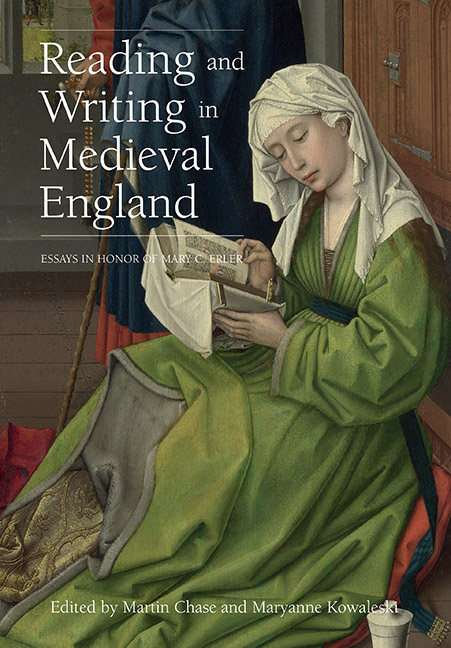Book contents
- Frontmatter
- Contents
- List of Illustrations
- List of Contributors
- List of Abbreviations
- Introduction: Bibliography in the Service of Biography
- “Withinne a Paved Parlour”: Criseyde and Domestic Reading in a City under Siege
- Beatrice Melreth: A London Gentlewoman and her Books
- How Intellectual Were Fifteenth-Century Londoners? Grammar versus Logic in the Citizens’ Encounters with Learned Men
- Social Memory, Literacy, and Piety in Fifteenth-Century Proofs of Age
- Crafting the Old Testament in the Queen Mary Psalter
- Affective Reading and Walter Hilton's Scale of Perfection at Syon
- Book Accessories, Gender, and the Staging of Reading
- Enska Vísan: Sir Orfeo in Iceland?
- Reading the Real Housewives of John Foxe's Book of Martyrs
- The Writings of Mary Carpenter Erler
- Index
- Tabula Gratulatoria
Reading the Real Housewives of John Foxe's Book of Martyrs
Published online by Cambridge University Press: 21 June 2019
- Frontmatter
- Contents
- List of Illustrations
- List of Contributors
- List of Abbreviations
- Introduction: Bibliography in the Service of Biography
- “Withinne a Paved Parlour”: Criseyde and Domestic Reading in a City under Siege
- Beatrice Melreth: A London Gentlewoman and her Books
- How Intellectual Were Fifteenth-Century Londoners? Grammar versus Logic in the Citizens’ Encounters with Learned Men
- Social Memory, Literacy, and Piety in Fifteenth-Century Proofs of Age
- Crafting the Old Testament in the Queen Mary Psalter
- Affective Reading and Walter Hilton's Scale of Perfection at Syon
- Book Accessories, Gender, and the Staging of Reading
- Enska Vísan: Sir Orfeo in Iceland?
- Reading the Real Housewives of John Foxe's Book of Martyrs
- The Writings of Mary Carpenter Erler
- Index
- Tabula Gratulatoria
Summary
In her diary entry for September 28, 1599, Lady Margaret Hoby writes:
In the morninge, after priuat praier, I tooke order for things about the house, and at 9 : I did eate my breakfast : then I hard Mr Rhodes [her chaplain] read tell allmost dinner time : after dinner I talked with Tho: Adesone about the purchassinge his owne farme : then I wrought [did needlepoint] tell allmost supper time, and after I had priuatly praied, I went to supper : after that I walked tell Lector time, and after that I hard one of the men read of the book of Marters, and so went to bed.
Lady Hoby's diary records the events of her life in Hackness from 1599 to 1605, where she managed her large manor house and estates. Typical of other entries, September 28 demonstrates how her day is divided between domestic duty and devotional practice. Her entry moves seamlessly between the two types of activity, painting a picture of a life in which these two spheres – domestic and spiritual – abut and overlap. The same intersection of domesticity and spirituality is echoed throughout the text Lady Hoby names – the “book of Marters.” In John Foxe's Book of Martyrs, women are often characterized by their distinctly domestic spirituality: their devotion intermingles with their everyday responsibilities as wives, mothers, and daughters. This similarity between readers like Lady Hoby and Foxe's female martyrs has inspired over thirty years of scholarship. In an early and influential article, Carole Levin argues that Foxe's female martyrs constituted role models for Tudor women, though she concludes by noting the difficulty of fitting all of Foxe's women into this model. Since then, critics have often sought to understand how these martyrs align with patriarchal expectations for wives, such as those outlined in conduct manuals and other such texts.
Yet Foxe's women are not intended to be mirrors for their readers’ behavior. Instead, Foxe's female martyrs are part of a much longer trajectory of women in hagiography, whose examples are intended to teach and inspire, rather than provide models for emulation.
- Type
- Chapter
- Information
- Reading and Writing in Medieval EnglandEssays in Honor of Mary C. Erler, pp. 211 - 232Publisher: Boydell & BrewerPrint publication year: 2019



